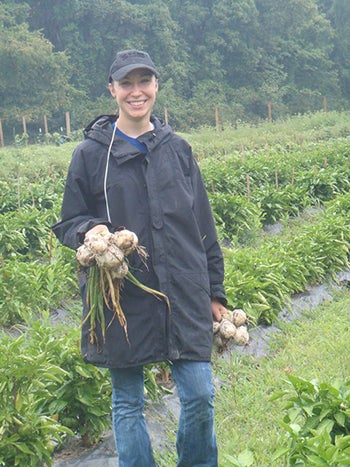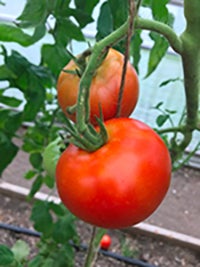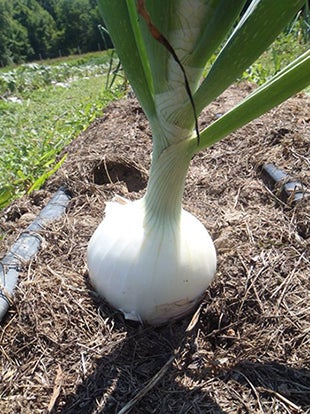The goals of the Farm Food Program are to provide new educational opportunities to faculty and students to study local food production in a sustainable way using mostly organic methods, and to deliver fresh produce and herbs to the campus and local restaurants.
In fall of 2009, the Farm administration worked to design a pilot project to start food production in February, 2010. Bon Appétit gave two gifts to the farm to help with the initial costs associated with acquisition of materials such as growing media, containers, fertilizers, seeds and plants.
Labor to produce the more than 6 tons of food grown in 2010 was performed by farm staff, student staff, student volunteers and other members of the community, including local high school students and faculty.
During 2019, more than 60 products were grown at the farm indoor and outdoor planting areas. The total production was over 12,000 lbs by the end of the year. Products included fresh honey, and oyster mushrooms.
Although the farm food program is not USDA Certified Organic, it uses techniques that are consistent with the principles of organic gardening. We use no herbicides, instead favoring the time-honored and labor-intensive tradition of manual weeding. When needed, more productive, gas-powered handheld tillers are used sparingly. Organic fertilizers are used as alternatives to traditional quick-release chemical fertilizers and instead of chemical insecticides, bio-controls such as predatory insects and plant derived solutions are employed for pest control as well as pest population monitoring systems.
"I went to the farm this November. It is so beautiful! The clear blue sky, the tall trees surrounding the homey houses, the smell of fresh earth and the delicious-looking vegetables growing in the gardens.
"I loved everything about it! I met a lot of new people there and it was great fun working in the gardens. The whole experience was interesting and educational, since I learned a lot about plants also. I would definitely do that again if I have the chance!"
Han Xu, CWRU student
Local and In Season
University Farm—like the rest of Case Western Reserve University—has sustainability and responsible environmental practices as its highest priority. Our partnership with the Bon Appétit Management Company allows us to align our sustainability goals for our food production with those of the campus' food service provider, a company with a proven track record of sustainable practices.
This synergy allows for our students, faculty and staff to be served fresh, locally—grown food from their very own farm, located ten miles east of main campus. Supporting local production also helps to reduce packaging, shipping costs, and the time that the produce sits after being harvested—meaning it is fresher, it lasts longer, and it tastes better.
Local Sourcing
The Farm Food Program also practices sustainability by locally sourcing as many of its products as it can. In an effort to encourage and support the development of local business, we source from local vendors for many of our raw material needs, from seeds to building structures. Our hoop houses are designed by Tunnel Vision Hoops in Cleveland.
In Season
Like traditional, weather-dependent farming, our biggest production occurs in the summer and early fall months when sun is abundant, temperatures are high and rain is falling. Each plant has specific optimal growing conditions related to temperature, soil composition, hydration, and sunlight. Each plant also has a specific ideal growing term to ripeness. For this reason, certain crops are only available at certain times of year, and they have peak production when ideal conditions align.
These days, with global production, a global market, and shipping and preservation capabilities, customers have come to expect these crops year-round and it is a challenging shift to eat in season. At the Farm, we are trying to make it possible to eat local produce throughout the year. Warm weather crops are still dependent on warm weather. They cannot be planted until May and typically are done producing after the first frost. However, with the greenhouse and high tunnels, it is possible to extend the growing season for a few crops like broccoli, green beans, carrots, and dark leafy greens. These can be grown with reduced production levels through the winter.
What We Grow
Each year the Farm Food Program has continued to grow and change based on previous years' experiences. Consequently, each year the crops change as well. Below is a list of recent crops.
Herbs
- Basil
- Chives
- Mint
- Oregano
- Rosemary
- Sage
- Thyme
Vegetables
- Assorted Edible Flowers
- Asparagus
- Beans
- Beets
- Oyster Mushrooms
- Shiitake Mushrooms
- Broccoli
- Cabbage
- Carrots
- Cucumbers
- Fennel
- Green Onions
- Kale
- Leeks
- Lettuce
- Mustard Greens
- Onion (storage)
- Peppers (sweet bell and hot)
- Radish
- Rhubarb
- Spinach
- Summer squash: Zucchini + yellow squash
- Sweet Potatoes
- Swiss Chard
- Tomatoes (cherry and field)
- Turnips
- Turnip Greens
Wild Edibles
- Ramps
- Sumac
- Garlic chives
- Garlic mustard
- Wild mushrooms
"Volunteering on the University Farm is a nurturing escape from the stresses of being a graduate student. Sometimes I would go into a dining hall, see what the cooks were making, and think to myself, "I probably had my hands on those vegetables the day before!" It is wonderful to know that the vegetables and herbs that I was harvesting were going to nourish the bodies and minds of those around me on campus."
Kathyrn Abbott, CWRU Student, Farm Volunteer





